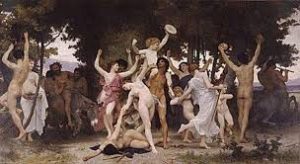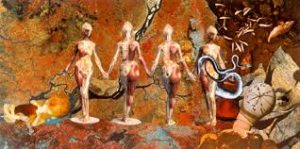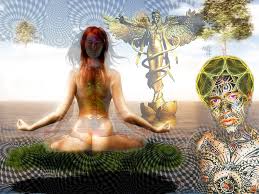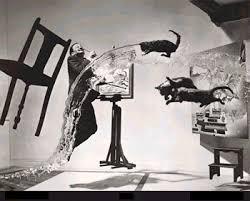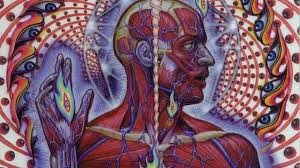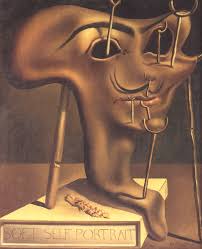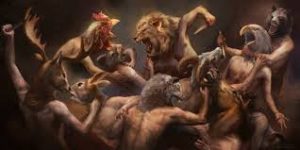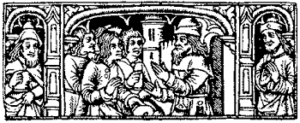The supposedly telepathic messages can be attributed to contemporaries — enemies, gods, devils, or what have you. Space People are a recent addition. In most cases, what we have here are expressions of strong portions of the self that are more or less purposefully kept in isolation. They may appear or disappear, psychologically speaking. They present a kind of chain of command — one that is not usually permanent for any long period, however.
Particularly when the voices or communications give orders to be obeyed, they represent powerful, otherwise repressed, images and desires, strong enough to form about themselves their own personifications. Some may seem relatively genuine in terms of presenting a fairly well-rounded representation of a normal personality. That is a fairly rare occurrence however. Usually we are presented with, say, semi-personalities, or even with lesser versions — fragmentary expressions of impulses and desires that are dramatically presented only in snatches heard by the person as a voice, or perceived as a presence.
In many situations, the main personifications are instead of a ritual nature, taking advantage of psychological patterns already present in the culture’s art of religion or science. We end up with Christs, spacemen and spacewomen, various saints or spirits, or other personality fabrications whose characteristics and abilities are already known.
We have schizophrenic models, in other words, and the particular model chosen in any case, at any given time — for the model change — gives indications quite clearly of the person’s basic problems and dilemmas. Such cultural models are present in society to begin with, because in one way or another they express in an exaggerated form certain portions of man’s and woman’s psychological reality that he or she does not as yet understand. This applies to the “good” schizophrenic models and to the “bad” ones — that is, to the gods as well as to the demons.
Such “communications” with the gods or demons, St. Pauls or Hitlers, represent in such instances dramatized, exaggerated personifications of the portion of the personality that is at the head of the chain of command at the moment.
In the first place, reality is primarily a mental phenomenon, in which the perceptions of the senses are organized and put together in ways that perfectly “mimic” in physical terms a primary non-physical experience. This is tricky to express, because the application of a psychological awareness through the auspices of the flesh automatically makes certain transformations of data necessary.
Devils and demons have no objective existence. They have always represented, again, portions of mankind’s and womankind’s own psychological reality that to some extent he and she had not assimilated — but in a schizophrenic kind of expression, projected instead outward from himself or herself. Therefore, it does not seem he or she must be held accountable for acts that he or she considers debasing, or cruel. He or she isolates himself or herself from that responsibility by imagining the existence of other forces — the devils or demons of the nether world.
On an individual basis, the schizophrenic carries through those cultural patterns. The contrasts between, say, the superior self or the idealized self, and the debased self, may vary. They may be brilliant apparent or somewhat blurred. In many such instances there will also be at least a short spurt of intense but scrambled, perhaps garbled, creative activity, in which the individual tries to recognize these various elements, as mankind and womankind has attempted many times in the creative, sometimes garbled creation of his or her own religions.
Here we can have anything from banal rubbish to the most excellent creative product, but in the schizophrenic framework it will be of brief duration, experience outside of the framework of usual day-to-day living, concentrated.
The Christ image is often used because it so perfectly represents the combination of the grandiose self, as per the all-knowing son of God, and the martyred victim who is crucified precisely because of his lofty position.
The Christ figure represents the exaggerated, idealized version of the inner self that the individual feels incapable of living up to. He or she is being crucified by his or her own abilities. He may — or of course she may — on other occasions receive messages from the devil, or demons, which on their part represent the person’s feelings about the physical self the seems to be so evil and contradictory in contrast to the idealistic image. Again, there is great variety of behavior here.
Such people, however, in their fashion refuse to accept standardized versions of reality. Even though they are so uncertain of themselves that their psychological patterns do follow those of culture, religion, science, or whatever, they try to use those patterns in their own personalities together long after most people have settled upon one official version or another — so their behavior gives glimpses of the ever-changing give-and-take among the various elements of human personality.
Most of the declared instances of telepathy or clairvoyance that happen in schizophrenic situations are instead the individual’s attempts to prove to himself or herself that the idealized qualities of omnipotence or power are indeed within grasp — this, of course, to compensate for the basic feeling of powerlessness in more ordinary endeavors. In some situations, however, there are definite, quite valid instance of telepathy or clairvoyance, vivid out-of-body experiences, and other excursions beyond the officially accepted realm of reality.
These are often complicated, however, since the individual’s belief patterns are of such an exaggerated blend to begin with, so that such episodes are usually accompanied by phantom figures from religion or mythology. The individuals may feel forced to have such experiences, simply because, again, they do not want to face responsibility for action, for the reasons given earlier.
In our terms of time, man and woman have always projected unassimilated psychological elements of his own personality outward, but in much earlier times he or she did this using a multitudinous variety of images, personifications, gods, goddesses, demons and devils, good spirits and bad. Before the Roman gods were fully formalized, there was a spectacular range of good and bad detities, with all gradations among them, that more or less “democratically” represented the unknown but sensed, splendid and tumultuous characteristics of the human soul, and have stood for those sensed but unknown glimpses of his own that man was in one way or another determined to explore.
It was understood that all of these “forces” had their parts to play in human events. Some stood for forces of nature that could very well be at times advantageous, and at times disadvantageous — as, for example, the god of storms might be very welcome to one time, in periods of drought, while his or her powers might be quite dreaded if he or she overly satisfied his or her people. There was no chasm of polarity between the “good gods and the bad ones.”
Jehovah and the Christian version of God brought about a direct conflict between the so-called forces of good and the so-called forces of evil by largely cutting out all of the intermediary gods, and therefore destroying the subtle psychological give-and-take that occurred between them — among them — and polarizing man’s and woman’s own view of his or her inner psychological reality.
There were no schizophrenics in the time of the pagans, for the belief systems did not support that kind of interpretation. This does not mean that certain behavior did not occur that we would now call schizophrenic. It means that generally speaking such behavior fit within the psychological picture of reality. It did so because many of the behavior patterns associated, now, with schizophrenia, are “distorted and debased” remnants of behavior patterns that are part and parcel of man’s and woman’s heritage, and that harken back to activities and abilities that at one time had precise social meaning, and served definite purposes.
These include man’s and woman’s ability to identify with the forces of nature, to project portions of his own psychological reality outward from himself and herself, and then to perceive those portions in a revitalized transformation — a transformation that then indeed can alter physical reality.
The next natural step would be to re-assimilate those portions of the self, to acknowledge their ancient origins and abilities, to return them so that they form a new coating, as it were, or a new version of selfhood. It is as if man and woman could not understand his or her own potentials unless he or she projected them outward into a godhead, where he or she could see them in a kind of isolated pure form, recognize them for what they are, and then accept them — the potentials — as a part of his or her own psychological reality. As a species, however, we have not taken the last step. Our ideas of the devil represents the same kind of process, except that it stands for our idea of evil or darkness, or abilities that we are afraid of. They also stand for elements of our own potential. I am not speaking of evil possibilities, but that man and woman must realize that he and she are responsible for his and he acts, whether they are called good or evil.
We make our own reality, Man’s and Woman’s “evil” exists because of his or her misunderstanding of his or her own ideals, because of the gap that seems to exist between the ideal and its actualization. Evil actions, in other words, are the result of ignorance and misunderstanding. Evil is not a force in itself.
Trust the body when it is undergoing many changes, for the changes are all for the better.



